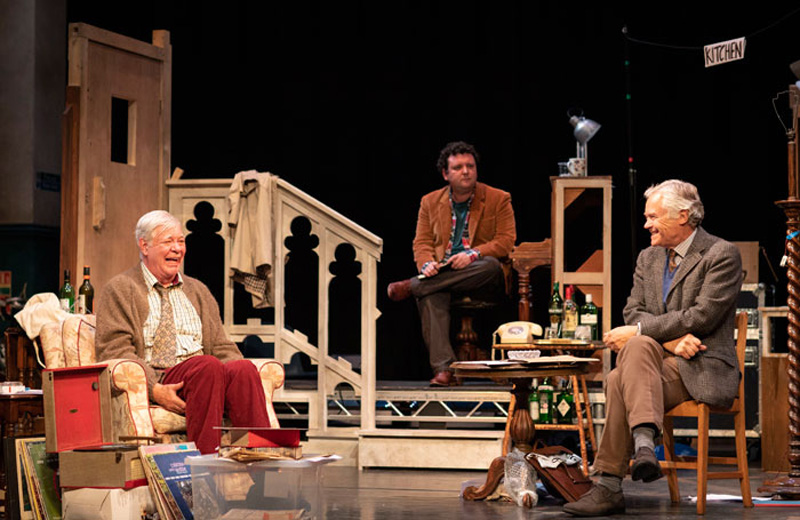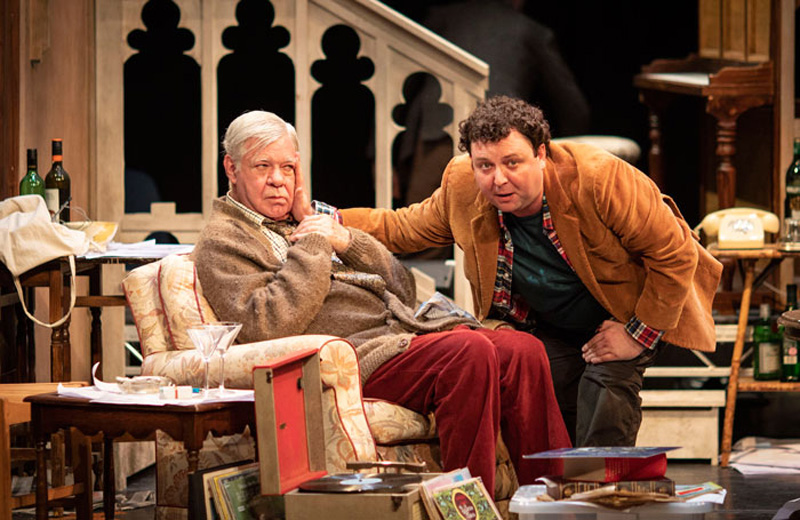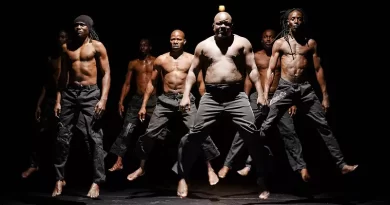“The Habit of Art”, Theatre Royal Brighton
Jeremy Malies in East Sussex
13 September 2018
In his The Habit of Art, Alan Bennett uses a play within a play to show a fictitious meeting between W.H. Auden and Benjamin Britten at an Oxford college in 1973 during which Auden asks to be allowed to write the libretto for Britten’s upcoming opera Death in Venice. After premiering at the National in 2009, the play has been revived by the Original Theatre Company and is on a tour which took in the Theatre Royal, Brighton.

Matthew Kelly, John Wark and David Yelland. Photo credit: Helen Maybanks.
We see a run-through of the play by a fractious regional theatre company. This format is Bennett’s skilful way of imparting information. The actors have mugged up on the historical figures and come out of character to reflect and bicker so allowing the audience to absorb background literary detail painlessly.
Matthew Kelly is outstanding as Auden and although the play that the company performs is deliberately insubstantial, when he has a long speech as Auden, Kelly’s acting takes wing. He inhabits the character while conveying an array of complex issues such as frustration with metrical form, compulsion to produce one more work of significance, and a heart broken by the love of his life (Chester Kallman) who could not be faithful to him. Auden is now living in the grounds of his Oxford alma mater, Christ Church.
Actors portraying poets on stage must impress immediately with their sensitivity to language if they are to be credible. Kelly’s rendition of Auden’s poem in memory of W.B. Yeats transfixes us. When the stage manager (in the outer play) defends her company to the author, reminding him that actors ‘go over the top’ every night and should be respected for bravery, I reflected on what a challenge Kelly has taken on here.
David Yelland is suitably clipped and patrician as Benjamin Britten but the rest of the show is stolen by John Wark as Humphrey Carpenter, an Oxford-educated BBC stalwart who interviewed Auden at about this time and would later write biographies of both artists. The script emphasizes that the actor playing Carpenter is anxious to advertise Carpenter’s wide artistic achievements which Wark does with gusto before shooing Britten away from the piano to accompany himself in a rousing version of “Show Me the Way to Go Home”. Carpenter voices Bennett’s concerns about the ethics of biography (Bennett is probably now dreading a hatchet job on his own life) and asks Auden the obvious question. Why did he flee Britain for New York as soon as war broke out only to skulk back to Europe for summer holidays as soon as hostilities were over?

Matthew Kelly and John Wark. Photo credit: Helen Maybanks.
As the action begins, Auden has phoned for what he describes as ‘ancillary caring services’ and when Carpenter arrives he mistakes him for the sex worker he has booked, giving rise to Carpenter’s wonderful line: “I’m not a rent boy! I went to Keble!” The gags abound. This college is home to another English professor, Tolkien, with whom Auden has no truck. “I hear he’s writing another book. More f*cking elves, I expect.”
The inner play is entitled Caliban’s Day and there is much discussion of The Tempest with Auden voicing his theory that the play is incomplete and an epilogue is missing. All the characters discuss Death in Venice and Auden’s pleadings with Britten to be his librettist (“I can still come up with the goods”) are a highpoint. Personally, I should have liked more of this and fewer of Bennett’s stock-in-trade cock jokes which seem to be part and parcel of having come out.
It’s a premise of the outer play here that the director is absent. The real director, Philip Franks, is very much in evidence and he imposes order on what will always be somewhat jumbled blocking with stage manager, prompt and author sitting on the main stage alongside the ‘actors’. At the National, the actors playing the production team were in a recessed area around the apron which was easier on the eye. Bennett should be excused the standard gag (the usually charitable David Hockney often made the same quip) about Auden’s skin fissures, when having Britten say: “Wystan has a face like his balls.”
The title goes back to Auden’s agonies as a writer. In the manner of Trollope who used to put his watch on the desk and write for three hours every day, Auden is compelled to grind out a modicum of work before bedtime. He has the habit of art. Added to this is a conviction that however lyrical his verse may be, music and particularly opera, is a superior mode of expression.
Amid all the cultural references, this is a play that underlines Bennett’s love and respect for actors. Brighton is an actorly town and a near-capacity audience adored the in-jokes. As Matthew Kelly suggests that Auden should have his poems pinned up in the study so that he can simply read rather than have to memorize them, he is slapped down by Veronica Roberts as the stage manager. “You did that for Uncle Vanya and Hedda Gabler. If he hadn’t been blind, you’d have done it in Oedipus.”
This is a piece about artists being aware of quality and formal structures. The plot is an ensemble effort anchored by Kelly who is at the top of his game and, sacrilegious as it sounds, better than the late Richard Griffiths in the same role. It’s an impressive revival of an enormously difficult, rewarding play.









